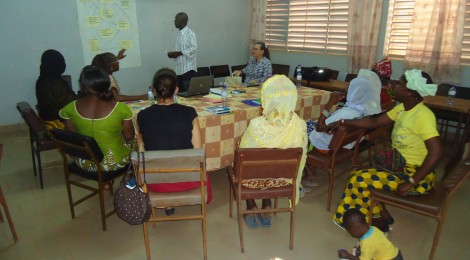
Defining social sustainability
Guest post by Brian Burke
Image: ![]()
![]()
![]() Some rights reserved by CGIAR Climate
Some rights reserved by CGIAR Climate
I came to the first INSS meeting wondering what it meant to put the adjective “social” before sustainability, and what this clarification was intended to achieve. And I think I was not alone. In the days since, as people have asked me what the meeting was about, I’ve often evaded my own doubts by simply explaining that it was about the social aspects of sustainability. The organizers, I explain, believe that a great deal of attention has been paid to the ecological and economic aspects of sustainability, but that we need to focus in greater depth on the social aspects in order to do more effective work for a sustainable society.
When I’m honest with myself, though, I’m not sure this captures the full sense of “social sustainability”. And unlike some network participants, I do think there is value in working to define the term, even (or perhaps especially) if this work only achieves a plurality of more refined and self-critical definitions of social sustainability rather than one monolithic one. Liz Miller’s linguistic analysis of the meetings will be interesting and valuable, but while we wait for that let me share a couple of the more common definitions of social sustainability that I heard at the conference.
One had to do with sustaining society. Just as ecological sustainability involves sustaining our ecological base and economic sustainability has to do with sustaining our economic base, the thinking goes, social sustainability must involve sustaining the societies that we have today. This definition is, of course, extremely problematic. As Sarah Bell pointed out in one of our small groups, if we had sustained the United States of the 1950’s, neither she nor any of the other women in that group would have even been involved in this conversation. So clearly there is a basic question about the quality of our society and relations of power, equity, and (in)justice within it.
A second definition seemed to hinge around “well-being.” This picks up on those questions of quality, though I suspect that it is tied conceptually to a pair of hopeful beliefs about sustainability transitions: (a) that people will only pursue ecological sustainability when it enhances their sense of well-being and (b) that the less-consumptive, scaled-down, and slowed-down social relations necessary for ecological sustainability will produce some sort of genuine well-being (different from the superficial well-being that we appreciate now in our state of ecological false consciousness). These beliefs are likely true at times and false at times, and in any case they are good hypotheses for us to examine. Still, this definition seems limited to that “social aspects of ecological sustainability” concept, which feels rather limited to me.
So what is another approach? It seems to me that it may be more (intellectually and politically) productive to think of social sustainability as a function of three things:
Social Sustainability = (1) the quality of the status quo (including question of well-being, justice, and ecological sustainability)
+ (2) the vulnerability of social relations to change (whether due to economic, ecological, or social forces; both positive and negative)
+ (3) capacity/resources for resilience and adaptation.
This then introduces into the social sustainability project a desire to change the world in order to make it more desirable, just, and ecologically sustainable, plus a long-term question of how those improved social relations may be disrupted due to predictable or unpredictable perturbations, plus an analysis of how we can both protect and enhance those improved social relations when changes arise.
And a fourth aspect of social sustainability may have to do with process: I would suggest that defining, theorizing, analyzing, and creating social sustainability requires inclusive and participatory approaches not only because these are normatively attractive, but also because these radically democratic processes are precisely the types of new traditions that we will need to bring into being in order to achieve all three of the elements of sustainability described above. (Herbert Reid and Betsy Taylor’s new book Recovering the Commons makes a very compelling, though somewhat dense, argument in favor of this position.)
_______________________________________________
Brian J. Burke is a Post-Doctoral Researcher with the Coweeta Listening Project at the University of Georgia


